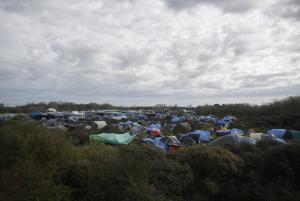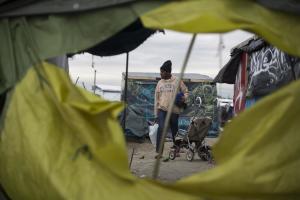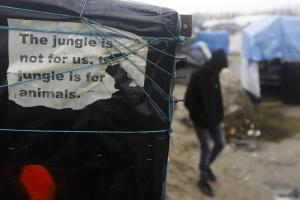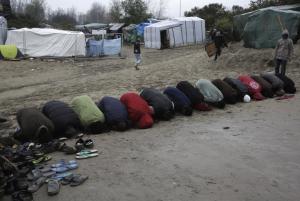Date: Tue, 24 Nov 2015 21:39:18 +0100
By SHAWN POGATCHNIK
CALAIS, France (AP) — Outside, acrid smoke from wood fires stings the eye, the stench of uncollected garbage and neglected toilets assaults the nose, and an autumn wind chills the bone. But inside Mimi Amanuel's immaculate wood-framed shack, the nightmare life of Calais' migrant camp cannot overpower a woman's dreams.
The Eritrean has left behind a husband and 6-year-old son to travel alone through the Sahara, across the Mediterranean to Italy, and finally to Europe's most strangely sophisticated shantytown with waterfront views of England.
She's not quite alone. The future kicks inside her.
"I am pregnant seven months. I do not know if boy or girl," Amanuel says in halting English, as she pours thick, sweet fire-brewed coffee from a flask into her lone china cup for a visitor.
Asked whether her child would be born in France or England, Amanuel caresses her belly and smiles: "I pray God brings me English baby."
That question confronts each one of the estimated 4,500 migrants stuck at this camp they call "the jungle." Will they cross the Channel and complete a journey that already has taken them through mountain passes and deserts, war zones and choppy seas? Or will they fall at the final hurdle and seek legal refuge in France's much more overloaded asylum system?
Their position has grown more precarious since Islamic State militants killed 130 people in Paris, fueling anti-migrant sentiment in France. Calais' mayor on Monday imposed a new identity card policy that effectively bars migrants from the city swimming pool. Police emptied a smaller campsite and raided the only Calais hotel that had offered rooms to migrants, ending the practice. A mobile clinic for migrants was torched, and hunters claiming to be stalking wildfowl fired shotguns in the air on the camp's perimeter.
Calais' campers, many with English language skills or relatives there, can see how tantalizingly close they are to their goal. On a crisp morning, the white-chalk cliffs of Dover can be seen 21 miles (34 kilometers) across the Channel. At night, lighthouses on the Kent coast make England look even nearer.
But it's an illusion. For most, Calais is the closest they will ever get to England's shore.
___
Asylum seekers from Africa, the Middle East and Asia have flocked for decades to the Pas-de-Calais, the strategic gateway to England. Julius Caesar launched his invasion of Britannia from here in 54 BC; Adolf Hitler contemplated the same in 1940.
World War II reduced Calais to rubble. The city of 125,000 today ranks among the poorest in France, with 12.8 percent unemployment and 30 percent of residents below the poverty line.
Ever since the Channel Tunnel's 1994 opening west of Calais, the city has become a migrant magnet. In a bid to eliminate camps citywide, authorities in 1999 opened a Red Cross-supervised refugee camp inside a former Eurotunnel factory in Sangatte near the Chunnel. Police spent three years chasing migrants down the tunnel before closing the camp.
History may repeat itself. Last year as illegal camps once again sprouted across Calais and migrants rioted near the ferry terminal, authorities decided to contain them within a new facility: a residential activity center beside a defunct German artillery bunker and a former city dump. The official shelter opened early this year, filled to capacity — and within weeks spawned a tent city covering the landfill site.
Approaching the camp on Calais' eastern edge along the Rue des Garennes — French for "rabbit warrens" — involves running a gantlet of chemical plants with signs warning of hazardous materials and smokestacks belching sulfurous emissions. Wind gusts flay passers-by with oily gravel.
After crossing a trash-strewn highway underpass, the rue runs into the camp's mud path entrance. Graffiti declares: "England good life. France dog life."
For months, sheer force of numbers favored the migrants. They sneaked into trailers of cargo trucks bound for ferries or sprinted past police onto the Chunnel's tracks, snarling services from London to Paris and Brussels. More than 20 died from falls, collisions and electrocution.
Those reckless days of open-field running have faded with the summer sun. In August, the governments of France and Britain struck a deal to stop the migrants' northward march at the water's edge of Calais.
In went waves of police reinforcements ringing the port, tunnel and camp. Up went an ever-growing network of 15-foot (5-meter) white fences.
Their tight steel mesh is too fine for fingers and feet. Those who reach the top face razor-wire coils. Beyond lie more fences, police patrols, sniffer dogs and heat-seeking scanners.
Many who have been caught 20 times or more have decided it's futile to keep trying until France drops its guard or England softens its rules of entry. Those with young children say it's impossible for them to breach security.
"If England takes us everything will be OK," said Arez Karzan, an Iraqi Kurd sitting in a lawn chair with his 16-month-old son sitting on his lap and munching a tomato.
"If not, we're willing to die here, no problem," he said matter-of-factly.
Not everyone is willing to stay put and wait. France estimates the population has thinned by at least 1,500 from October's high of 6,000 as scores daily agree to be bussed to state-provided housing nationwide. Women and families get priority, leaving the camp increasingly male, single and volatile.
As Sangatte collapsed in violence, so too could "the jungle." This month for three straight nights, hundreds of frustrated young men tried to block the highway after midnight, tearing out road signs and pelting the windows of passing trucks. Police responded with tear gas.
"It feels like things are escalating," said Rowan Farrell, a volunteer aid worker from Manchester, England, who lives from his van. He said if violence continued, the peaceful majority would flee for shelter elsewhere, but the deepening roots of "the jungle" made continued growth just as likely.
"It's impossible to know. There might be nothing here in six months. There might still be a camp of several thousand people in three years."
___
Barred from reaching England, migrants face an increasingly hostile environment after the Friday the 13th attacks on Paris.
Within hours of the massacre, camp residents staged public demonstrations to highlight their shock and their fear of being branded Islamic State sympathizers.
"Pray for Paris," some wrote on small cardboard placards. "We know how you feel ... it wasn't our fault," wrote an 11-year-old Afghan girl, holding her own hand-written message aloft. About 200 Muslim and Christian residents joined hands with British aid volunteers to pray for the victims.
"The people who attacked Paris are our enemies. They want to kill us too," said Rami Salim, a Syrian who studied English literature in Damascus and hoped to teach English in England. His parents and nine siblings fled their village near Aleppo as Islamic State forces approached and now live in a refugee camp in Turkey. He and his brothers did not want to fight in the army of Syrian President Bashar al-Assad either.
"We just want to live in peace. We just need a safe place," he said.
The Calais camp is not a safe place. As the November sun retreats and nighttime temperatures drop as low as 4 Celsius (39 Fahrenheit), volunteers are scrambling to replace thin-skinned tents with sheds of tarp and plywood containing carpet walls and sometimes wood-burning furnaces. Most still live in tents prone to collapse in heavy rains and howling Channel winds.
To combat the darkness and cold, campers light nighttime fires beside their tightly packed tents and candles inside them. Three times this month, blazes driven by high winds or exploding gas canisters have destroyed more than 150 tents and shacks, injuring several migrants.
French immigration lawyers successfully sued the government this month to double the provision of water taps and portable toilets and to broaden paths into proper roads for ambulances, fire trucks and garbage trucks. Bulldozers and diggers have started that work, with plans to build 125 heated container-style shelters by January capable of housing 1,500 people. But emergency vehicles still won't enter, leaving migrants and aid workers to carry out wounded and battle flames themselves.
The camp's unrelenting development is driving unintended social consequences. A growing class of migrants has businesses and religious flocks to oversee. Google Maps has even begun to pin camp landmarks, including the Doctors of the World first aid huts.
"They have been stuck here for months, so they try to make the most of it," said Calais volunteer Pascal Froehly, a retired high school English teacher.
"A few months ago the usual answer you got from them was: London tomorrow! They weren't thinking of settling down here until they found out England isn't as easy to reach as they thought," he said, speaking over a din of saws, drills and hammers as another convenience store and fast food counter took shape.
Afghans have built more than 50 businesses lining the camp's main junction for a kilometer (half mile) in each direction, aided by settled relatives in France or Britain who bring supplies by car. With no taxes or wages to pay and a captive market, the illegal shops can be surprisingly profitable. Buckets serve as cash registers.
At night, some drink cans of beer for 1 euro ($1.10) each under the swirling lights of an electronic disco ball at the Sahara, one of several African-run bars in the camp.
Next door, veiled women from the Horn of Africa kiss the symbol of the cross as they enter the gates of the candlelit St. Michael's Jungle Orthodox Church overseen by a brawny dreadlocked Ethiopian in combat trousers, Solomon Gatachow.
Gatachow is the church's protector, living in a hut beside the entrance and listening overnight for thieves, who already have stolen one generator.
"I wish I had the wisdom of Solomon. I would be with my wife now," he said ruefully, recalling how this summer they had sneaked aboard the same Chunnel train together.
Police found him. Minutes later his wife telephoned him, still on board and undiscovered: Where was he? The train was moving into the tunnel.
Today she is seven months' pregnant in England's second-largest city, Birmingham. Gatachow knows his unborn child is a boy, but he doesn't know how he'll ever see him or his wife. They left their two sons, aged 4 and 7, behind in Addis Ababa with relatives to save them from crossing the Sahara by smugglers' truck.
"We felt it was better to die on our own than with our kids beside us," he said.
In his mind, he's always trying to catch that Chunnel train to England. In reality, he's given up the chase.
"I miss my wife. I will always hate this place," he said. "But I cannot make it there."








